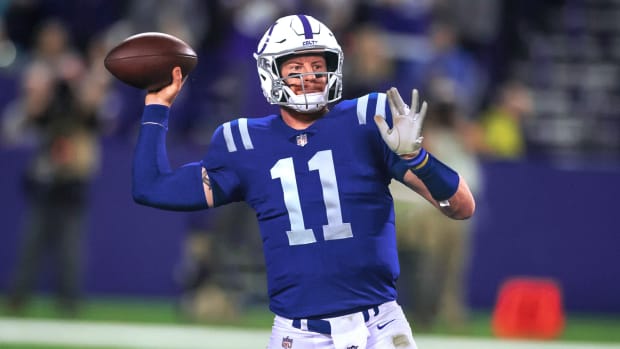The Eagles’ one-time franchise QB will reunite with an old coach, but the trade terms suggest Wentz has to click early in Indy.
The good news, if you are Carson Wentz, is that on Thursday you got your wish. There is no more looming quarterback controversy. There is no more hard-shelled fanbase who maybe, possibly, if you looked at it a certain way, never fully appreciated you. There is no more front office that routinely praised you, signed you to a long-term deal and then perhaps in your own mind, gave up on you.
There is a Colts team ready to return to the playoffs, and a head coach in Frank Reich who was largely responsible for your best years as an Eagle.
The bad news is that this is probably not the long runway Wentz was hoping for. As our Albert Breer reported Thursday, the terms of the Wentz trade are a 2021 third-round pick and a 2022 second-round pick. The second-round pick becomes a first-round pick if the Colts play Wentz on 75% or more of their offensive snaps this year, or if Wentz plays 70% or more of the snaps and the Colts make the playoffs.
General manager Chris Ballard may not come out and say it, but he’s done a lot of fine work building a roster that is probably another left tackle away from seriously contending for the Super Bowl (with the right quarterback). Given the era of nomadic, championship-seeking quarterback movement upon us, will Ballard sit idly by, squandering valuable resources longer than he needs to in order to give Wentz a long-term shot, especially if he can just go out and find another quarterback willing to join the Colts next year?
Put another way: If Wentz doesn’t come out of the gate looking like the quarterback who led Philadelphia to the playoffs in 2017, and the Colts are fading from playoff contention by December, what is to stop Indianapolis from pumping the brakes on the Wentz experiment quickly in fear that a looming draft pick doesn’t become a far more valuable one?
Maybe this is a pessimistic point of view. Maybe some of us watched the Colts last year and wondered what a little functional mobility might look like in the pocket, and how all the trappings of Reich’s offensive system couldn’t be implemented because of Philip Rivers’s physical limitations. (That said, Rivers was 11th in Sports Info Solutions’ “Points Earned” metric, while Wentz was dead last. Rivers played far better than he was given credit for in 2020, but Wentz has far more raw athleticism and mobility at this point in his career.) Maybe some of us saw the play Wentz can still make with some regularity—the balletic, rolling out and squeezing through defenders only to hit a receiver sliding toward the sideline in the gut 15 yards away—and thought it preferential to a throwaway.
And there is probably some reason for optimism. Reich understood Wentz better than Wentz may have understood himself at the professional level. His organization of the offense in 2017 was like a buffet of Wentz’s creature comforts, which produced a potent confidence in the quarterback, who led the Eagles on a tear. When Reich left to coach the Colts and more responsibility was handed to the franchise quarterback, the resulting cracks in the offensive ideology were never patched together.

A return to this comfort, plus the ability to play eight games a year in a domed stadium with a healthy set of wide receivers, may end up handing the Colts the steal of the decade; a version of Wentz that had inspired so much initial confidence in Philadelphia (enough to produce a long-term contract that, when peeled off Philadelphia’s books, will officially create the biggest dead money crater in NFL history).
But it may also end up giving them a quarterback who needs the luxury of a clock that isn’t always running out on him. That freefall began the moment Doug Pederson put Jalen Hurts into a football game and refused to take him back out last winter. Based on the conditions of this trade, that clock is still ticking.